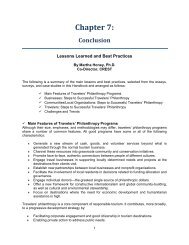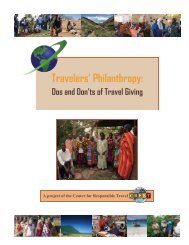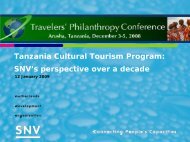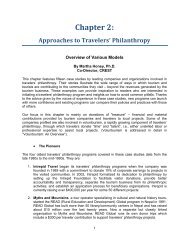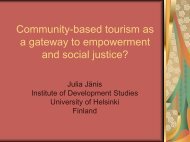Travelers' Philanthropy Handbook - Center for Responsible Travel
Travelers' Philanthropy Handbook - Center for Responsible Travel
Travelers' Philanthropy Handbook - Center for Responsible Travel
You also want an ePaper? Increase the reach of your titles
YUMPU automatically turns print PDFs into web optimized ePapers that Google loves.
conditions <strong>for</strong> it. If a tourist is indifferent to the poverty and suffering observed during trips tothe poorest parts of the earth, then the tourist will not be acting ethically in situations wheretrying to use one’s wealth and connections to help others is – I would argue – morallyobligatory. If good intentions can produce bad outcomes, a starting point is franklyacknowledging that this is so. Such acknowledgement takes us on the right path: away fromnaiveté about human nature and human interactions, away from self-delusion and frompremature self-congratulation about how noble we are. Where our expectations <strong>for</strong> successare too high, then the answer is to lower them, not to abandon expectations altogether. Wherewe have failed to examine incentives and disincentives built into project design, then we shouldbuild in positive incentives <strong>for</strong> key actors to do their job and reduce disincentives to sabotagethe work. Once we identify the mechanisms by which a donor’s good intentions can go astray,we can set up counter-mechanisms that anticipate problems and creatively bypass or overcomethem. We can act philanthropically on a deliberately experimental basis, continually learningwhat works and doesn’t work and refining behaviors and institutions so the chances <strong>for</strong> successnext time are increased. The risk of failure is always there. The challenge is not to eliminaterisk but to reduce it to a manageable level.• A Checklist of Criteria <strong>for</strong> Ethical <strong>Travel</strong>ers’ <strong>Philanthropy</strong>A specific recommendation is to turn to the third alternative mentioned in my earlier scenarioabout where the philanthropic tourist’s money should be placed. I said very little then aboutgrassroots organizations with local knowledge and local legitimacy, but now I’ll say more. Atour lodge owner or tour operator has, I believe, a moral obligation to search <strong>for</strong> and identifysuch an organization, if it can be found, and to work closely with that organization to identifyprojects meeting the following criteria: Is the project sufficiently small-scale and low-techthat it can be implemented fairly easily, withsubstantial reliance on local labor and expertise? Is the project needed and desired by the localpeople? Assuming that there will bedisagreements on this score, is there aAmy Biehl Township Tours. Capetown.mechanism – or could one be set up - to setCredit: www.amybiehl.co.zalocal-level priorities and make them known tofuture tourists expressing a desire to help? An important factor here is getting advancecommitments by local people to contribute “sweat equity” to a project. Their free laborreduces project costs, builds upon traditions of community self-reliance, and indicatescollective commitment on the part of the beneficiaries to see a project through to the end.Free local labor increases the chances that the community will take psychological ownershipof the project, maintain it after completion, and not fall into the dependency trap. Can agreement be reached in advance of starting a project as to who will finance andadminister maintenance and repair costs of infrastructure, so there is a sustainable return onthe tourists’ philanthropic investment? Is the project likely to appeal to future tourists visiting the lodge?189




